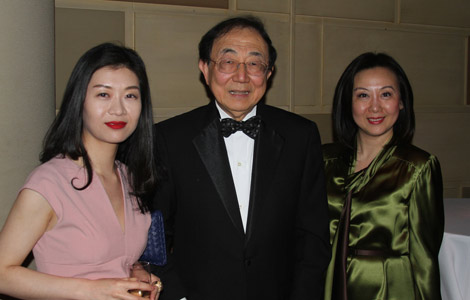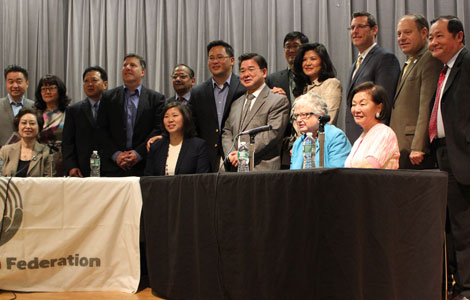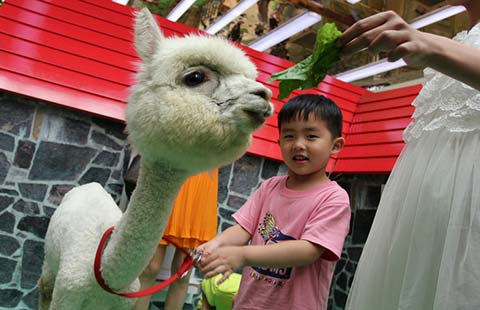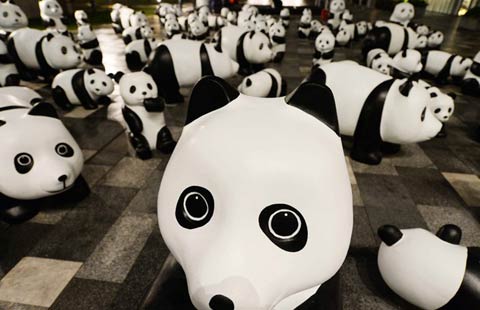Translators share tips on how to convey meaning
Updated: 2014-06-04 07:00
By Sun Ye (China Daily)
|
||||||||
Experts debated how to upgrade the quality of translation at the three-day Translation and Communication of Chinese Culture Forum at Beijing Language and Culture University that closed recently.
Some 400 professionals in the translation and cultural communications business, working in languages from English to Arabic, met to discuss problems and find ways to make this critical work better in the country.
"If you compare our economic power to its cultural influence, it's very disproportionate," says Wang Gangyi, the secretary-in-general at the Translators Association of China. "If we look at influential overseas publications on China after 2000, the majority of them don't come from the country."
"Putting the original Chinese meanings across is very important," says Chen Mingming, former ambassador to New Zealand and translator with the Ministry of Foreign Affairs.
"Translating should be up-to-date and especially careful with expressions uniquely Chinese. Otherwise, misunderstandings would spread."
For him, word-for-word renditions are not always effective in carrying out exact meanings.
"We Chinese tend to use a lot of adjectives to embellish, so what is said is often an overstatement," he says. "We also have set phrases which are metaphors whose true meanings lie very deep."
The misleading translations that result are gradually being corrected as professionals increasingly notice such problems. Other participants noted other ways to help readers and listeners understand Chinese culture across the language divide.
"My secret is (American) dialect to (Chinese) dialect," says Chen Chunge, a popular subtitle translator and paraphraser of US TV talkshows.
For him, "classy" Shanghai dialect is similar to English used in more refined occasions, as teenager and showbiz talk in English pairs best with Mandarin with a Taiwan twist.
"American English, which is generally bolder and straightforward, can sometimes best keep its essence when translated into our equally blunt Northeasterner's dialect," he says.
"Trying to do vernaculars as grounded as possible in both languages - that's my tip to getting the messages across."
Cui Xiangwei, guest professor at the Academy of Traditional Chinese Opera, says the key to understanding Peking Opera is hearing it not only in its original Chinese in song but also hearing the lines read at the same time in the audience's mother tongue.
"I take it from my experience as a simultaneous translator that it's much more effective to hear it in your own language than reading a script," he says. "And the original is not lost as you also listen to it at the same time."
"Conveying Chinese culture to the world needs quality translations," says Liu Deyou, translator and former vice-minister of culture.
"We need cream-of-the-crop masters who have thorough knowledge of both languages and culture. But we are also in urgent need of a large number of professionals who can inventively recreate the messages so they're more understandable to outsiders."
sunye@chinadaily.com.cn
(China Daily 06/04/2014 page19)

 Council of Fashion Designers of America Awards
Council of Fashion Designers of America Awards
 Fan Bingbing, first Chinese actress in Barbie Hall of Fame
Fan Bingbing, first Chinese actress in Barbie Hall of Fame
 Awarding ceremony of 2014 hito Pop Music held in Taipei
Awarding ceremony of 2014 hito Pop Music held in Taipei
 Zhao Liying's photo shoot for Children's Day
Zhao Liying's photo shoot for Children's Day
 'Taken 2' grabs movie box office crown
'Taken 2' grabs movie box office crown
 Rihanna's 'Diamonds' tops UK pop chart
Rihanna's 'Diamonds' tops UK pop chart
 Fans get look at vintage Rolling Stones
Fans get look at vintage Rolling Stones
 Celebrities attend Power of Women event
Celebrities attend Power of Women event
Most Viewed
Editor's Picks

|

|

|

|

|

|
Today's Top News
Foreign tech firms pose threat on Internet
US sets subsidy rates on China's PV products
US to boost military in Europe
US calls for missile defense against DPRK
Director of JFK to make movie on Snowden
Male-named hurricanes strike more fear, US researchers find
Super-sized rocky planet found beyond solar system
Rapid-fire questions turn up heat on Hagel
US Weekly

|

|








